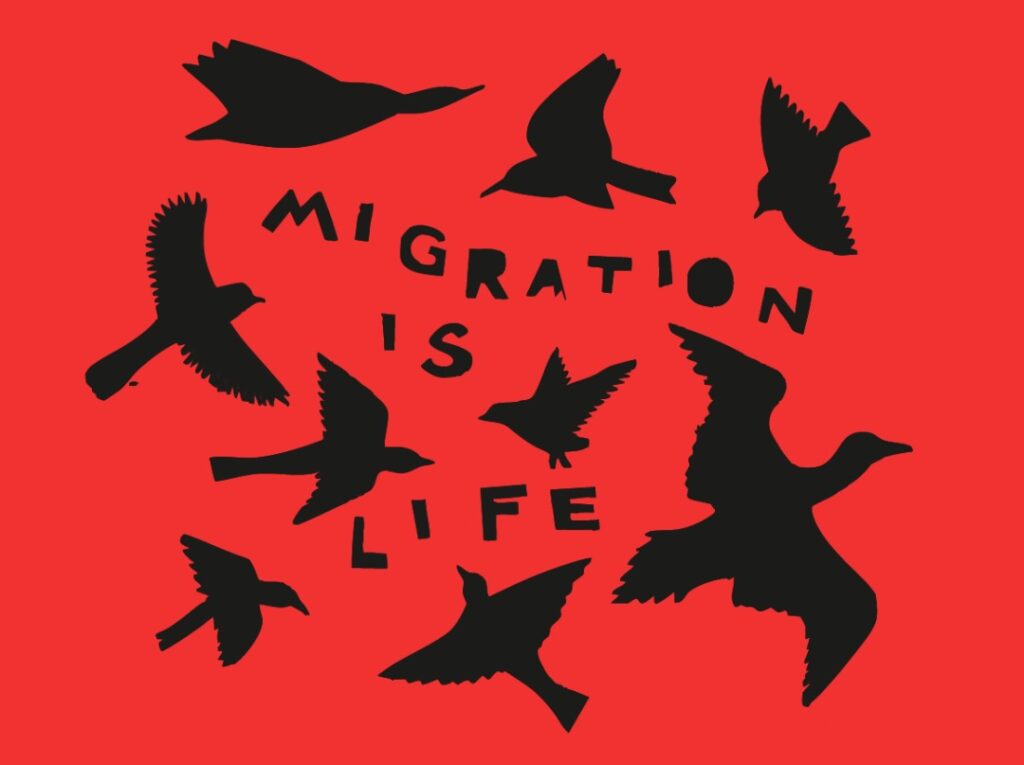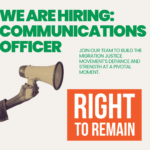Words Have Consequences: How Government Language Fuels Racist Violence Against Racialised Communities
Across the UK, we are seeing significant levels of violence targeted against racialised and migrant communities. This violence comes in different forms, from words and language to describe and attack communities, to incidents of physical violence. Last weekend we saw this in Essex, where hundreds of so called ‘demonstrators’ rioted, attacking police and staff outside a hotel which houses asylum-seekers. Far-right groups were present, inciting much of the violence.
Here at Right to Remain – we do not name these incidents as ‘protests’ and ‘demonstrations’, as widely reported by the media. We name them for what they really are – racist hatred against communities, that are scapegoated for failures in systems that are not of their doing. We have seen similar violence and rioting over recent times. This was especially clear in Summer 2024, where we saw ‘race riots’ explode across the UK, terrifying communities.
It’s easy to blame these incidents on ‘extremists’ or ‘local frustrations’. But the truth is deeper and more dangerous. These protests do not come out of nowhere. They are shaped and fuelled by the way politicians and media talk. When inflammatory, racist, or dehumanising language is used to describe racialised and migrant communities, it gives permission for hate to spread. Racism is not separate from politics. It is shaped by it.
Language That Dehumanises
Racist violence against racialised and migrant communities has been linked to dehumanising and criminalising language. This is not an accident. We regularly see politicians using dehumanising words like ‘illegal’; ‘invasion’; ‘swarm’; ‘floods’; ‘hordes’; ‘queue-jumpers’ and benefit-tourists’. There has been extensive research showing the links between this type of offensive language and the violence we see perpetrated against communities.
By cementing the myths that the UK is being invaded by criminal migrants, politicians can justify increasingly harsh immigration policy and pander to the rise in right-wing popularity in parts of the UK.
In 2012, Theresa May, the then Home Secretary, announced that she was creating a ‘hostile environment’ for ‘illegal’ migrants, we saw hostile language in the media about migrant communities more than doubling. In 2018, Boris Johnson, the Foreign Secretary at the time, equated Muslim women with letterboxes. This led to a 375% increase in reported hate crimes against Muslim communities the following week.
Recently we saw Keir Starmer talk about Britain becoming an ‘island of strangers’. This reflected the language of the widely accepted as racist ‘Rivers of Blood’ speech by Enoch Power, a Conservative MP in 1968. Starmer was later to apologise for his choice of language, denying a lack of knowledge that his words were similar to those of Enoch Powell. Which really did little to deny the racist effect of his words.
This language is not accidental. It is part of a political strategy to appear “tough” on immigration – to win votes and to distract from other issues, such as the huge disparities we see across communities in the UK. Blaming racialised and migrant communities for these disparities is a convenient way to detract from Government failures.
But this language has real-world consequences. When people in power talk about migrants as criminals, threats, or invaders, the public hears a message: That these people are not like us. They do not belong. They are dangerous. And they react.
The Link to Racism
This government language doesn’t just target migrants, it taps into long histories of racism in the UK. When the Government speaks about ‘illegal migrants’, they are not imagining Americans, Canadians, or Australians, they are evoking images of a Black or Brown face in a small boat. This coded language reinforces racial stereotypes. It builds on centuries of colonial narratives: that Black and Brown people are ‘others’, that they come to take, that they bring violence, disease and chaos.
As Nadine El-Enany argues in her brilliant, Bordering Britain – immigration control has always been about racial identity. Modern borders are not neutral, they are built on ideas of Whiteness, national identity, and exclusion. When politicians talk about defending Britain’s borders, they are often defending a vision of Britain that is White and closed.
From Words to Violence: The Protest Pattern
When this language circulates, through speeches, press briefings, and headlines – it spreads.
Far-right groups seize on it. They echo the same words. They organise violent actions in places that support racialised and migrant communities. They spread misinformation, claiming that asylum seekers are criminals, or that they have been given luxury treatment while ‘British people suffer’. In many cases, local people join these actions, often not out of hatred, but out of fear, confusion, or frustration, which has been stoked by media and political messaging. And when the far-right leads the narrative, things often turn violent.
This is how racist violence grows. It begins with words. Then it becomes threat. Then it becomes action.
What Could Be Said Instead?
Leaders could use their platforms to tell the truth:
That people fleeing war, torture, and persecution are entitled to seek asylum. That the UK has international and moral obligations to protect them. That migration is part of human history, not a threat. That the system is broken, not because of the people in it, but because of hostile policies.
But instead, they choose to dehumanise. They echo the same ideas – tighter controls, faster returns and ‘secure borders’. Without challenging the racist logic underneath, these promises only reinforce the same fear.
Words Build the World
Words are not neutral. They shape how we see others. They shape how we act. When governments use racist, hostile, or fear-filled language, it creates the conditions for real harm: threats, protests, attacks, and even riots.
But words can also heal. Words can build bridges. They can tell the truth. It is time political leaders stood up and chose those words — before any more harm is done.
We are Resistance and Solidarity
Racism does not happen in isolation. It is made, shaped and encouraged by those in power. But it can also be resisted.
Across the UK, communities are organising in solidarity with asylum seekers and migrants. People are turning out to defend hotels, challenge far-right marches, support the right to protest against huge injustices and demand better from our Government. Legal challenges are pushing back against Government cruelty. Migrants communities themselves — including survivors of torture, trafficking, and war – are speaking out and building power.
We recognise that current events are having an enormous impact on our communities of people seeking asylum, refugees and migrants across the UK. We want you to know that at Right to Remain we stand in solidarity with you and against all forms of racism and hatred.
We need to change the story. A story where people seeking safety are not threats, but welcome additions to the UK. Where diversity is not a danger, but strength. Where history is acknowledged — and repair is made.
We are proud to be part of the story of resistance and solidarity with all of you. Stay safe.
Right to Remain team


















Discussion:
One comment on “We need to change the story – solidarity not racism”